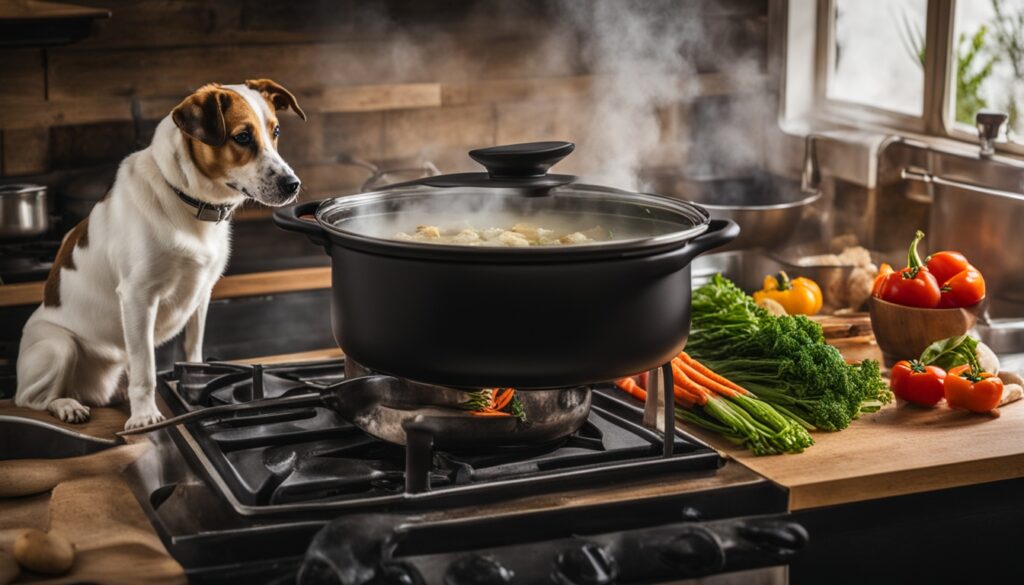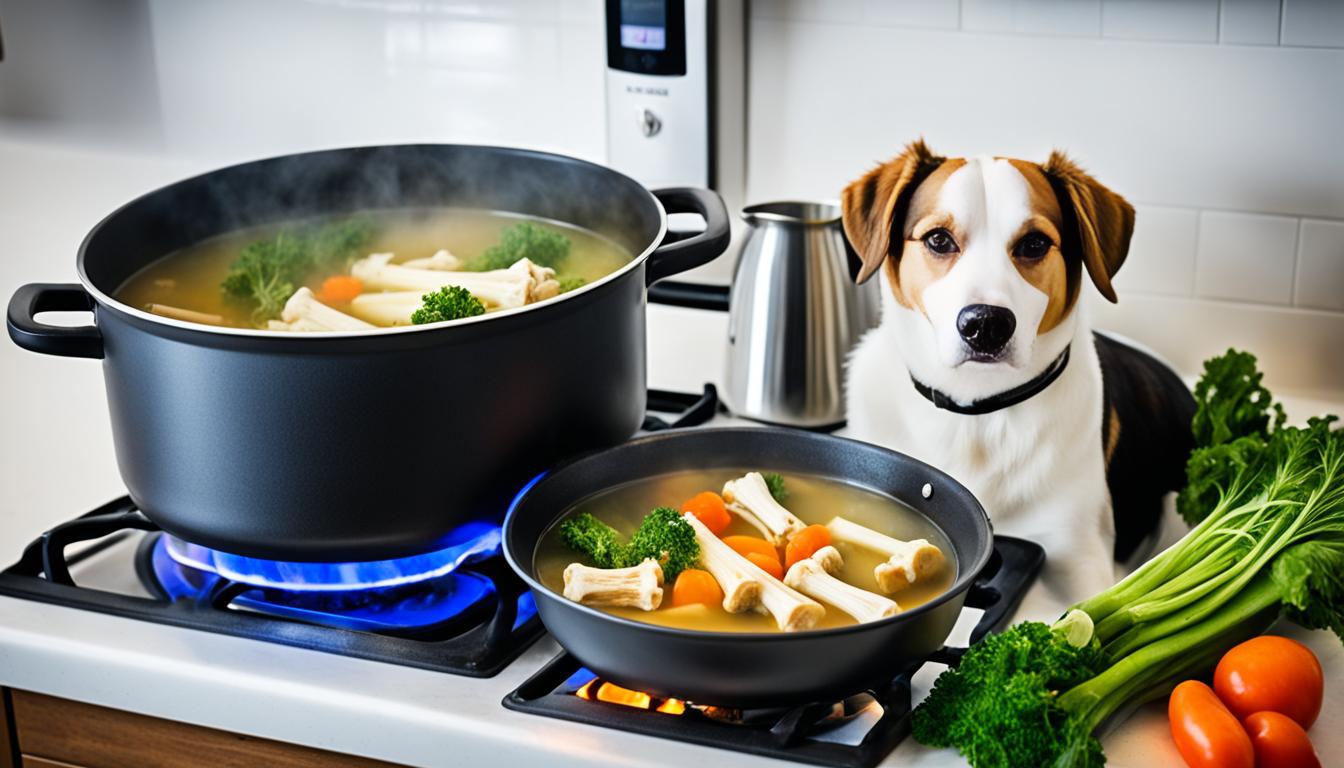Ever wondered how to enhance your dog’s meals? The answer lies in making bone broth for dogs. This nutrient-packed broth is beneficial for your pet’s health and can be easily made at home. Discover how to create this wholesome bone broth for dogs to boost their diet and support their overall well-being.
Table of contents
- Key Takeaways
- Health Benefits of Bone Broth for Dogs
- Essential Ingredients for Dog Bone Broth
- Step-by-Step Process on How to Make Bone Broth for Dogs
- Storing and Serving Homemade Bone Broth for Dogs
- Nutritional Content of Bone Broth for Dogs
- Why Some Bone Broths Don’t Gel and How to Fix It
- Conclusion
- FAQ
- Q: How do you make homemade bone broth for dogs?
- Q: What are the health benefits of bone broth for dogs?
- Q: What types of bones are best for making bone broth for dogs?
- Q: What vegetables and herbs should be included in homemade bone broth for dogs?
- Q: Why is apple cider vinegar added to the bone broth?
- Q: How do you store homemade bone broth for dogs?
- Q: What are some serving suggestions for bone broth in a dog’s diet?
- Q: What nutrients are found in bone broth for dogs?
- Q: Why doesn’t my homemade bone broth gel, and how can I fix it?
Key Takeaways
- Bone broth is essential for maintaining a healthy gut, supporting the immune system, and protecting joint health in dogs.
- Recommended bones include organic, grass-fed joint bones like chicken feet and beef marrow bones.
- Prepare by boiling bones in water with raw apple cider vinegar or lemon juice in a slow cooker for about 24 hours.
- The broth should have a jelly-like consistency, indicating a high gelatin content.
- Store bone broth in the fridge for up to 4-5 days or freeze in mason jars or ice cube trays for longer preservation.
- Bone broth serves as a nutritious and healing supplement in your dog’s diet.
- Introduce bone broth slowly, adjusting the serving size based on your dog’s needs and size.
Health Benefits of Bone Broth for Dogs
Bone broth is a great supplement for dogs. It’s full of nutrients that help keep them healthy. Adding it to their diet is a smart move.
Supports Joint Health
Bone broth is great for dogs’ joints. It has glucosamine and chondroitin to lessen joint pain and inflammation. The collagen in it also helps keep tendons and ligaments strong, making joints more mobile.
Boosts the Immune System
Bone broth is full of vitamins, minerals, and amino acids that boost a dog’s immune system. A strong immune system helps fight off sickness and infections. Turmeric in the best bone broth for dogs adds antioxidants, keeping immune health in check.
Improves Digestive Health
Bone broth is also good for dogs’ stomachs. It soothes the gut, aids digestion, and balances the gut microbiome. This is great for dogs with sensitive stomachs or digestive problems. The marrow and collagen in it help ease stomach discomfort, making it a top choice for digestive health.
Adding bone broth to a dog’s diet brings many benefits. It helps with joint health, boosts the immune system, and improves digestion. When picking a bone broth, look for brands like Open Farm Bone Broth. It has turmeric and pumpkin for extra health perks.
| Benefit | Description |
|---|---|
| Supports Joint Health | Contains glucosamine, chondroitin, and collagen which reduce inflammation and improve mobility |
| Boosts the Immune System | Rich in vitamins, minerals, and amino acids essential for immune defense |
| Improves Digestive Health | Soothes the gut and enhances the gut microbiome, reducing digestive issues |
Essential Ingredients for Dog Bone Broth
Knowing what goes into making great bone broth for dogs is key. These ingredients are packed with nutrients that help with joint health, digestion, and a strong immune system.
Types of Bones
Choosing the right bones is important for homemade dog bone broth. Raw bones like chicken feet, beef marrow, and oxtail are top picks. They’re full of gelatin, which is good for bones, joints, and the gut.
Vegetables and Herbs
Adding veggies and herbs to bone broth makes it even better. Carrots, spinach, and mushrooms are great choices:
- Carrots: They give you beta-carotene, which is good for your dog’s eyes and immune system.
- Spinach: It’s full of iron and important vitamins.
- Mushrooms: These add nutrients and antioxidants that boost your dog’s health.
These ingredients make the bone broth very nutritious for dogs.
Additives: Apple Cider Vinegar

Apple cider vinegar is a must-have when making bone broth for dogs. It helps pull out minerals and gelatin from the bones. This makes the broth even more effective for joint health, digestion, and overall well-being.
| Ingredient | Benefits |
|---|---|
| Chicken Feet | High in collagen and gelatin |
| Beef Marrow Bones | Rich in marrow and nutrients |
| Oxtail | Excellent source of gelatin |
| Carrots | Good source of beta-carotene |
| Spinach | High in iron and vitamins |
| Apple Cider Vinegar | Aids mineral and gelatin extraction |
Step-by-Step Process on How to Make Bone Broth for Dogs
Making a nutritious bone broth for your dog is easy and rewarding. This guide will help you make a tasty and healthy broth. You can use a slow cooker or a pressure cooker.

Preparation of Ingredients
Start by collecting fresh ingredients. You’ll need raw animal bones with marrow, carrots, celery, parsley, and thyme. Don’t use onions or garlic as they can be bad for dogs. To boost the gelatin, add raw chicken or duck feet and a ¼ cup of apple cider vinegar to get minerals from the bones.
Choosing the Right Equipment
Picking the right equipment is key. You can use a slow cooker, crockpot, Dutch oven, or Instant Pot. The equipment you choose affects the cooking time and method. Each has its own benefits for convenience and time-saving.
Cooking Methods: Slow Cooker vs. Instant Pot
For a slow cooker, cook on low for 24-36 hours. This long cooking time pulls out lots of nutrients and makes the broth gelatinous. It’s great for joint health and digestion.
If you’re short on time, try the pressure cooker. Cook in the Instant Pot for 8-12 hours. This method is quick but still packs a nutritional punch. Remember to stir and check on it to get the right consistency.
| Cooking Method | Recommended Time | Key Benefits |
|---|---|---|
| Slow Cooker | 24-36 Hours on Low Setting | Maximal Nutrient Extraction, Ideal Gelatin Formation |
| Instant Pot | 8-12 Hours | Time-Efficient, Sufficient Nutrient Extraction |
After cooking, let the broth cool down. Then, strain it to take out all the bones. This makes sure the broth is safe for your dog. You can store it in the fridge for up to five days or freeze it for up to a year.
Storing and Serving Homemade Bone Broth for Dogs
After making homemade bone broth for dogs, it’s key to store it right. This keeps its nutrients and keeps it safe.
Proper Storage Techniques
Storing bone broth right makes it last longer and keeps its good stuff. Keep it in the fridge for up to four days. Freezing it is great for keeping it fresh for up to three months. Make sure to only store the liquid, not the bones or veggies.
Use airtight glass containers in the fridge to keep fridge smells out. For freezing, put the broth in silicone ice cube trays or small bags. This lets you thaw just what you need, keeping the broth quality high.
Serving Suggestions
There are many ways to serve bone broth to dogs. You can pour it over their food to make it tastier and more nutritious. Or, freeze it in molds to make cool bone broth dog treats for hot days.
- Use bone broth as a kibble topper to improve the taste and nutritional profile of your dog’s meal.
- Add a serving of bone broth to raw or homemade dog food for extra hydration and nutrition.
- Freeze bone broth in silicone molds to create fun, refreshing dog treats.
- Mix bone broth into your dog’s water to encourage hydration, especially for picky drinkers.
Remember, give your dog 1-2 tablespoons of bone broth for every 10 pounds of body weight. Always watch your dog when they eat bone broth to make sure they’re eating safely.
By storing and serving bone broth safely and smartly, your dog gets lots of benefits in a tasty way.
Nutritional Content of Bone Broth for Dogs
Bone broth for dogs is a nutritional powerhouse that can significantly enhance their health. It is packed with numerous healthful bone broth ingredients known to benefit different aspects of canine well-being. Notably, bone broth supplements for dogs provide essential nutrients like vitamins, minerals, collagen, and amino acids that support their overall health.
Vitamins and Minerals
Bones used in making bone broth are rich in essential minerals such as magnesium, calcium, sulfur, silicon, and phosphorus. These minerals are crucial for maintaining a dog’s bone and dental health. Additionally, bone broth contains trace amounts of iron and zinc, which are vital for various bodily functions, including oxygen transport and immune response.
Collagen and Gelatin Benefits
One of the standout components of bone broth is collagen, which breaks down into gelatin during the cooking process. Collagen in bone broth for dogs is incredibly beneficial, contributing to joint health by promoting the strength and flexibility of cartilage. Moreover, the gelatin derived from collagen aids in healthy digestion by repairing the gut lining and preventing conditions like leaky gut syndrome.
Chronic inflammation can lead to severe diseases like arthritis, diabetes, heart disease, some cancers, and canine dementia.
Amino Acids and Protein Content
The amino acids found in bone broth, such as glycine and arginine, possess powerful anti-inflammatory properties that can help manage chronic inflammation in dogs. Glycine is crucial for liver detoxification and overall tissue repair. The high protein content, including essential amino acids, supports muscle health and growth.
Here’s a quick look at the guaranteed analysis of Bones & Co. Beef Bone Broth:
| Nutrient | Minimum Content |
|---|---|
| Crude Protein | 3.0% |
| Crude Fat | 0.1% |
| Crude Fiber | 0.5% |
| Moisture | 97% |
In summary, incorporating bone broth supplements for dogs into their diet is an excellent way to ensure they receive these critical nutrients. From collagen in bone broth for dogs to its rich amino acid profile, this superfood supports various aspects of canine health, making it an indispensable addition to their daily nutrition.
Why Some Bone Broths Don’t Gel and How to Fix It
Achieving a gel-like consistency in homemade bone broth means it’s full of collagen, which is key for its health benefits. But, some broths don’t gel. This part looks into why and gives bone broth preparation tips to help with gelatin formation.
Common Causes for Non-Gelling Broth
Several things can stop bone broth from gelling:
- Inadequate Bone Selection: Not using enough jointy bones or the wrong bones like feet, oxtail, and knuckle can stop it from gelling.
- Incorrect Water to Bone Ratio: Too much water can dilute the collagen, stopping the broth from thickening. Fill the pot half to two-thirds with bones and cover them with water by one to two inches.
- Excessive Cooking Time: Cooking the broth too long or at too high heat can break down the gelatin proteins into amino acids. This stops the gelling process.
- Lack of Acidic Medium: Acidic mediums like apple cider vinegar are needed to get collagen from bones. Not having enough vinegar can stop the broth from gelling.
Tips to Ensure Gelatin Formation
Here are ways to improve gelatin formation in homemade bone broth:
- Bone Selection and Ratio: Use more jointy bones. For beef, use about 7 pounds of bones per gallon of water. Include feet, oxtail, and knuckle bones. For chicken, use 3-4 pounds of bones per gallon.
- Proper Simmering: Keep a gentle simmer, not a boil. Chicken and turkey bones simmer for 8 to 24 hours. Beef, lamb, and pork bones simmer for 12 to 72 hours. Fish heads and bones simmer for 4 to 24 hours to keep gelatin proteins intact.
- Optimal Acid Addition: Apple cider vinegar is key. Use about 2 tablespoons per gallon of water to get the most collagen.
- Adding Beef Gelatin: As a last resort, add beef gelatin for dogs. Mix about 2 tablespoons of powdered gelatin per quart in 1 cup of cold water before adding it to the broth.
To improve the homemade bone broth consistency, make sure the ratios are right, simmer properly, and add vinegar and gelatin. This will boost the nutritional value and make a great meal for your pet.
Conclusion
Bone broth is great for dogs because it helps with joint and immune health, digestion, and overall well-being. It’s full of nutrients like glycine and collagen. These make it a strong choice for your dog’s diet.
It reduces inflammation, helps with nutrient absorption, and keeps skin and fur healthy. This makes it clear why adding bone broth to your dog’s diet is a good idea.
Bone broth is packed with nutrients that boost your dog’s health. It can ease joint pain in dogs with arthritis and support their immune system. It also has calcium, magnesium, and phosphorus for strong bones and teeth.
Gelatin in bone broth soothes and repairs the gut, improving digestion. This makes bone broth a key part of a healthy diet for dogs.
Making and storing bone broth is easy. Use bones from grass-fed or pasture-raised animals for the best nutrition and safety. You can store it in the fridge for a week or freeze it for six months.
This makes it easy to keep a supply on hand. Bone broth can be a refreshing treat in summer or a warm drink in winter. But, talk to your vet before giving it to your dog, especially if they have digestive problems.
FAQ
Q: How do you make homemade bone broth for dogs?
A: To make bone broth for dogs, start with beef marrow and knuckle bones. Add fresh veggies like celery and carrots, and herbs like thyme and parsley. Use a slow cooker and add apple cider vinegar to extract minerals. Cook on low for 24 hours, then strain and store it right.
Q: What are the health benefits of bone broth for dogs?
A: Bone broth supports joint health with glucosamine and chondroitin. It boosts the immune system with vitamins and minerals. It also helps with digestive health by easing digestive issues and improving the gut microbiome.
Q: What types of bones are best for making bone broth for dogs?
A: For making bone broth, use chicken feet, beef marrow, and oxtail. These bones are high in gelatin, adding nutrition and making the broth gel.
Q: What vegetables and herbs should be included in homemade bone broth for dogs?
A: Include nutrient-rich veggies like carrots and celery. Add herbs like thyme and parsley to boost flavor and health benefits.
Q: Why is apple cider vinegar added to the bone broth?
A: Apple cider vinegar helps get the most minerals and gelatin from the bones. This makes the bone broth more nutritious and thick.
Q: How do you store homemade bone broth for dogs?
A: Keep homemade bone broth fresh in the fridge for five days or freeze it for a year. Proper storage keeps it safe and beneficial for your dog.
Q: What are some serving suggestions for bone broth in a dog’s diet?
A: Use bone broth as a kibble topper, a raw food addition, or a frozen treat. Always give the liquid and avoid cooked bones.
Q: What nutrients are found in bone broth for dogs?
A: Bone broth is packed with vitamins and minerals like calcium, phosphorus, and iron. It has collagen for skin, coat, and bone health. Plus, it has amino acids and proteins for muscles.
Q: Why doesn’t my homemade bone broth gel, and how can I fix it?
A: If your broth doesn’t gel, it might be from overcooking, high heat, or wrong water-to-acid ratio. Adjust cooking time, use the right amount of apple cider vinegar, and add beef gelatin to get it gel-like.
